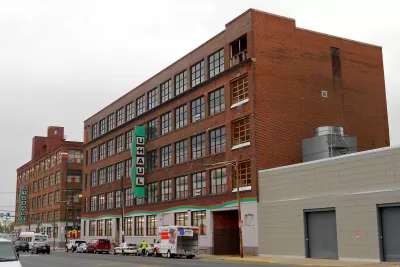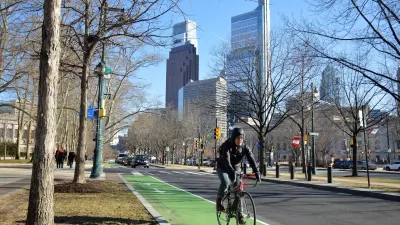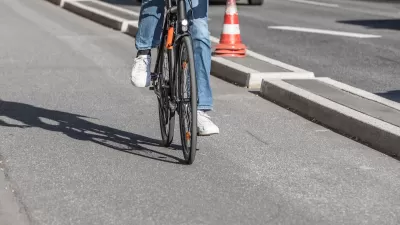The city pulled the plug on a proposed street redesign after community groups criticized the public engagement process for not listening to all local voices.

A plan to redesign a dangerous five-lane Philadelphia street by reducing it to three traffic lanes and adding parking-protected bike lanes has stalled after local opponents voiced concerns that the public engagement process didn't reach enough residents and stakeholders. As Jared Brey reports, the city's Office of Transportation, Infrastructure, and Sustainability (OTIS) developed the plan for Washington Avenue with a focus on Complete Streets principles, but ultimately decided to change the design.
"With U.S. pedestrian deaths spiking and the federal government calling for a national roadway safety initiative, Philly's surprise U-turn on Washington Avenue shows how efforts to redesign streets for multiple user groups can get complicated, particularly in gentrifying areas," Brey writes. "Road diets can be very visible signs of neighborhood change, and they’re driven by city government, so communities often associate them with a range of issues that go beyond traffic safety. Bike lanes in particular are often seen as symbols of gentrification."
Although more than 70 percent of respondents in a city survey supported the three-lane plan, some residents say they were never given information about the project or the opportunity to respond to the survey. According to Mike Carroll, deputy managing director for OTIS, the fact that the concerns came from Black, low-income communities made the office take pause and "recalled painful historical instances of destructive transportation planning done by technocrats without input from communities of color."
OTIS is going back to the drawing board and "moving forward with plans to redesign the street, using elements of the three-lane and four-lane mixed approach. The office says it will announce the construction plans at a public meeting on March 1."
The source article provides more details on the three alternatives for the Washington Avenue redesign, all of which include protected bike lanes.
FULL STORY: How a Philadelphia Road Redesign Went Off the Rails

Trump Administration Could Effectively End Housing Voucher Program
Federal officials are eyeing major cuts to the Section 8 program that helps millions of low-income households pay rent.

Planetizen Federal Action Tracker
A weekly monitor of how Trump’s orders and actions are impacting planners and planning in America.

Ken Jennings Launches Transit Web Series
The Jeopardy champ wants you to ride public transit.

New Mexico Aging Department Commits to Helping Seniors Age ‘In Place’ and ‘Autonomously’ in New Draft Plan
As New Mexico’s population of seniors continues to grow, the state’s aging department is proposing expanded initiatives to help seniors maintain their autonomy while also supporting family caregivers.

USDOT Waters Down Self-Driving Car Regulations
The agency is reducing reporting requirements for autonomous vehicles and cars with self-driving features, prompting concern among safety advocates who say transparency is essential to the safe deployment of AV technology.

‘Minnesota Nice’ Isn’t so Nice When You Can’t Find a Place to Live
The Economic Development and Housing Challenge Program can help address the scourge of homelessness among Indigenous people.
Urban Design for Planners 1: Software Tools
This six-course series explores essential urban design concepts using open source software and equips planners with the tools they need to participate fully in the urban design process.
Planning for Universal Design
Learn the tools for implementing Universal Design in planning regulations.
Heyer Gruel & Associates PA
Ada County Highway District
Institute for Housing and Urban Development Studies (IHS)
City of Grandview
Harvard GSD Executive Education
Toledo-Lucas County Plan Commissions
Salt Lake City
NYU Wagner Graduate School of Public Service





























